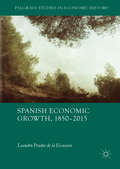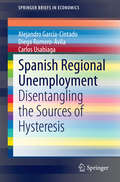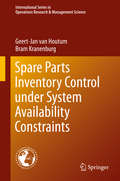- Table View
- List View
Spacious Lawns and Long Commutes: The Irrationality of Choosing to Live in the Suburbs
by Peter A. UbelSocial scientists have discovered in the last couple of decades that people's decisions are often biased by an inability to predict what will make them happy. Many economists, however, have overlooked or underemphasized the importance of people's emotional lives in their decision-making processes. Standard economic theory, for instance, holds that if commuting is a source of unhappiness, people will choose long commutes only if they believe such commutes will raise their happiness in other ways, like bringing them higher pay or better living conditions. However, studies conducted in Germany and the U.S. have found that the longer people commute each day, the less satisfied they are with their overall lives. In this chapter, behavioral scientist Peter Ubel, explores the failure of the market to give us the neighborhoods and the commutes that we deserve. This chapter is excerpted from "Free Market Madness: Why Human Nature Is at Odds with Economics--and Why It Matters."
Spain - Culture Smart!
by Marian MeaneyCulture Smart! provides essential information on attitudes, beliefs and behavior in different countries, ensuring that you arrive at your destination aware of basic manners, common courtesies, and sensitive issues. These concise guides tell you what to expect, how to behave, and how to establish a rapport with your hosts. This inside knowledge will enable you to steer clear of embarrassing gaffes and mistakes, feel confident in unfamiliar situations, and develop trust, friendships, and successful business relationships.Culture Smart! offers illuminating insights into the culture and society of a particular country. It will help you to turn your visit-whether on business or for pleasure-into a memorable and enriching experience. Contents include* customs, values, and traditions* historical, religious, and political background* life at home* leisure, social, and cultural life* eating and drinking* do's, don'ts, and taboos* business practices* communication, spoken and unspoken"Culture Smart has come to the rescue of hapless travellers." Sunday Times Travel"... the perfect introduction to the weird, wonderful and downright odd quirks and customs of various countries." Global Travel"...full of fascinating-as well as common-sense-tips to help you avoid embarrassing faux pas." Observer"...as useful as they are entertaining." Easyjet Magazine"...offer glimpses into the psyche of a faraway world." New York Times
Spain on Screen
by Ann DaviesA collection of original essays from leading scholars in the field exploringthe contemporary debates, concerns and controversies ongoing in Spanish film industry, culture and scholarship. The essays reveal the far-reaching shifts that have occurred in the Spanish film scene, making essential reading for all interested in European cinema. "
Spain: 2001 Article IV Consultation--Staff Report; Staff Supplement; and Public Information Notice on the Executive Board Discussion
by International Monetary FundA report from the International Monetary Fund.
Spain: Can the House Resist the Storm?
by Diego CominOn September 16, 2008, President Rodriguez Zapatero recognized the severity of Spain's macroeconomic situation and clearly pointed to the culprit in front of the Spanish Congress: "Let nobody doubt it; there is already a wide consensus about the origin of the crisis: [It is] in the U.S. and its subprime mortgages." During the last eight years, Spain had gone through a phenomenal expansion that has had many important ingredients: immigration, housing boom, banking and financial market regulation, current account deficit, and productivity growth. This case analyzes how they interacted during the period 2000-2007 and what drove the Spanish recession in 2008.
Spain: Converging with the European Community
by Michel Galy Gonzalo Pastor Thierry PujolSpain's participation in European integration has strengthened its policymaking credibility and created an enviroment conducive to sustainable economic growth. Over the last decade, Spain has seen improvements in inflation, output, employment, and its balance of payments, and it has substantially reformed its product, labor, and financial markets. This paper reviews Spain's past economic performance and sees good prospects for further rises in living standards
Spain: Financial Sector Assessment Program--Detailed Assessment of the IMF Code of Good Practices on Transparency in Monetary and Financial Policies--Financial Policies
by International Monetary FundA report from the International Monetary Fund.
Spain: Selected Issues
by International Monetary FundA report from the International Monetary Fund.
Spain’s Photovoltaic Revolution: The Energy Return on Investment
by Charles A. Hall Pedro A. PrietoThe Energy Return on Energy Invested (EROI or EROEI) is the amount of energy acquired from a particular energy source divided by the energy expended, or invested, in obtaining that energy. EROI is an essential and seemingly simple measure of the usable energy or "energy profit" from the exploitation of an energy source, but it is not so easy to determine all of the energy expenditures that should be included in the calculation. Because EROI values are generally low for renewable energy sources, differences in these estimates can lead to sharply divergent conclusions about the viability of these energy technologies. This book presents the first complete energy analysis of a large-scale, real-world deployment of photovoltaic (PV) collection systems representing 3.5 GW of installed, grid-connected solar plants in Spain. The analysis includes all of the factors that limit and adjust the real electricity output through one full-year cycle, and all of the fossil fuel inputs required to achieve these results. The authors' comprehensive analysis of energy inputs, which assigns energy cost estimates to all financial expenditures, yields EROI values that are less than half of those claimed by other investigators and by the solar industry. Sensitivity analysis is used to test various assumptions in deriving these EROI estimates. The results imply that the EROI of current, large-scale PV systems may be too low to seamlessly support an energy and economic transition away from fossil fuels. Given the pervasiveness of fossil fuel subsidies in the modern economy, a key conclusion is that all components of the system that brings solar power to the consumer, from manufacturing to product maintenance and life cycle, must be improved in terms of energy efficiency. The materials science of solar conversion efficiency is only one such component. Sunny Spain represented an ideal case study as the country had the highest penetration of solar PV energy at 2.3 percent of total national demand as well as state-of-the-art expertise in solar power including grid management of intermittent, modern renewable systems. This book, written by a uniquely qualified author team consisting of the chief engineer for several major photovoltaic projects in Spain and the world's leading expert on the concept and application of EROI, provides a comprehensive understanding of the net energy available to society from energy sources in general and from functioning PV installations under real-world conditions in particular. The authors provide critical insight into the capacity of renewable energy sources to fill the foreseeable gap between world energy demand and depletion rates for fossil fuels. · Presents the first comprehensive study of the EROI of large-scale solar PV systems in a developed country · Uses real-world operational data rather than laboratory approximations and extrapolations · Describes the dependence of one alternative energy source on the goods and services of a fossil-fueled economy · Has global implications for the potential of renewable energy sources to replace dwindling reserves of fossil fuels · Written with the first-hand knowledge of the chief, on-site engineer for many solar installations in Spain together with the leader in the development and application of the concept of EROI
Spam Nation: The Inside Story of Organized Cybercrime—from Global Epidemic to Your Front Door
by Brian KrebsA New York Times bestseller and winner of a 2015 Prose Award!There is a threat lurking online. A secret war with the power to destroy your finances, steal your personal data, and endanger your life.In Spam Nation, investigative journalist and cybersecurity expert Brian Krebs unmasks the criminal masterminds driving some of the biggest spam and hacker operations targeting Americans and their bank accounts. Tracing the rise, fall, and alarming resurrection of the digital mafia behind the two largest spam pharmacies—and countless viruses, phishing, and spyware attacks—he delivers the first definitive narrative of the global spam problem and its threat to consumers everywhere.Blending cutting-edge research, investigative reporting, and firsthand interviews, this terrifying true story reveals how we unwittingly invite these digital thieves into our lives every day. From unassuming computer programmers right next door to digital mobsters like "Cosma"—who unleashed a massive malware attack that has stolen thousands of Americans' logins and passwords—Krebs uncovers the shocking lengths to which these people will go to profit from our data and our wallets.Not only are hundreds of thousands of Americans exposing themselves to fraud and dangerously toxic products from rogue online pharmacies, but even those who never open junk messages are at risk. As Krebs notes, spammers can—and do—hack into accounts through these emails, harvest personal information like usernames and passwords, and sell them on the digital black market. The fallout from this global epidemic doesn't just cost consumers and companies billions, it costs lives too.Fast-paced and utterly gripping, Spam Nation ultimately proposes concrete solutions for protecting ourselves online and stemming this tidal wave of cybercrime—before it's too late."Krebs's talent for exposing the weaknesses in online security has earned him respect in the IT business and loathing among cybercriminals… His track record of scoops...has helped him become the rare blogger who supports himself on the strength of his reputation for hard-nosed reporting." —Bloomberg Businessweek
Spanish Business Dictionary: Multicultural Business Spanish
by Morry SoferDoing business in Spanish requires a dictionary that is up-to-date with the 21st century. Because terminology differs from Spain to Latin America, from Argentina to Mexico, businesspeople need a dictionary that provides terms used throughout the Spanish-speaking world. The Spanish Business Dictionary fulfills such a need. In addition to hundreds of new computer and internet terms, this dictionary includes all areas of business terminology used in the United States and throughout the Spanish-speaking world with designators for the country of the term's origin.
Spanish Central America: A Socioeconomic History, 1520-1720
by Murdo J. MacleodThe seventeenth century has been characterized as "Latin America's forgotten century. " This landmark work, originally published in 1973, attempted to fill the vacuum in knowledge by providing an account of the first great colonial cycle in Spanish Central America. The colonial Spanish society of the sixteenth century was very different from that described in the eighteenth century. What happened in the Latin American colonies between the first conquests, the seizure of long-accumulated Indian wealth, the first silver booms, and the period of modern raw material supply? How did Latin America move from one stage to the other? What were these intermediate economic stages, and what effect did they have on the peoples living in Latin America? These questions continue to resonate in Latin American studies today, making this updated edition of Murdo J. MacLeod's original work more relevant than ever. Colonial Central America was a large, populous, and always strategically significant stretch of land. With the Yucatán, it was home of the Maya, one of the great pre-Columbian cultures. MacLeod examines the long-term process it underwent of relative prosperity, depression, and then recovery, citing comparative sources on Europe to describe Central America's great economic, demographic, and social cycles. With an updated historiographical and bibliographical introduction, this fascinating study should appeal to historians, anthropologists, and all who are interested in the colonial experience of Latin America.
Spanish Economic Growth, 1850–2015
by Leandro Prados de la EscosuraThis book is open access under a CC BY 4. 0 license. This text offers a comprehensive and nuanced view of the economic development of Spain since 1850. It provides a new set of historical GDP estimates for Spain from the demand and supply sides, and presents a reconstruction of production and expenditure series for the century prior to the introduction of modern national accounts. The author splices available national accounts sets over the period 1958-2015 through interpolation, as an alternative to conventional retropolation. The resulting national accounts series are linked to the historical estimates providing yearly series for GDP and its components since 1850. On the basis of new population estimates, the author derives GDP per head, decomposed into labour productivity and the amount of work per person, and placed into international perspective. With theoretical reasoning and historiographical implications, Prados de la Escosura provides a useful methodological reference work for anyone interested in national accounting. 'This book stands among the classics for the Kuznetian paradigm in empirical economics. This is the definitive study of Spain's transition to a modern economy. ' --Patrick Karl O'Brien, Emeritus Fellow at St. Antony's College, the University of Oxford, UK, and Professor Emeritus of Global Economic History at the London School of Economics and Political Science, UK 'The definitive account of Spanish economic growth since 1850, based firmly on a magisterial reconstruction of that country's national accounts and an unrivalled knowledge of both Spanish and global economic history of the period. ' --Stephen Broadberry, Professor of Economic History at Nuffield College, the University of Oxford, UK
Spanish Money And Banking
by Gabriel Tortella José Luis García RuizThis book incorporates advances in financial and monetary history and theory and shows the relevance of Spain's story to modern banking, monetary and development theory. It studies the early development of banking and monetary institutions and shows how financial and monetary mismanagement contributed to the decline of Spain in the early modern era
Spanish Regional Unemployment
by Alejandro García-Cintado Diego Romero-Ávila Carlos UsabiagaThis work investigates the time series properties of the unemployment rate of the Spanish regions over the period 1976-2011. For that purpose, the authors employ the PANIC procedures of Bai and Ng (2004), which allows to decompose the observed unemployment rate series into common factor and idiosyncratic components. This enables the authors to identify the exact source behind the hysteretic behaviour found in Spanish regional unemployment. Overall, the analysis with three different proxies for the excess of labour supply renders strong support for the hysteresis hypothesis, which appears to be caused by a common stochastic trend driving all the regional unemployment series. In the second part of the analysis the authors try to determine the macroeconomic and institutional factors that are able to explain the time series evolution of the common factor, and in turn help us shed light on the ultimate sources of hysteresis. The reader shall see how the variables that the empirical analysis emphasises as relevant closely fit into the main causes of the Spanish unemployment behaviour. Finally, some policy considerations drawn from the results are presented.
Spanish Sociedades Laborales—Activating the Unemployed
by Jens Lowitzsch Sophie Dunsch Iraj HashiThis book investigates the potential of the Spanish Sociedades Laborales (SLs) as an instrument of active labour market policy for re-turning the unemployed to the labour market and also the transferability of the scheme to other EU Member States. Spanish Sociedades Laborales (SLs) - mostly small and micro enterprises - are a qualified form of conventional corporation, majority-owned by their permanent employees. Unemployed persons can capitalise their unemployment benefits as a lump sum to start a new SL or to recapitalise an existing SL by joining it. This makes SLs similar to start-up subsidies for the unemployed, an established instrument of active labour market policy across the EU. The new 2015 Law on Worker-Owned and Participatory Companies substantially modernised the concept of SLs 30 years after its inception. The book tackles two currently widely discussed policy issues at both the EU level as well as the national level, i. e. , reactivating unemployed in the context of ALMP and encouraging employee co-ownership in the context of the economic reform agenda in particular with regard to corporate governance, regional economic stimuli and distributive justice.
Spanish Tourism Geographies: Territorial Diversity and Different Approaches (Geographies of Tourism and Global Change)
by Macià Blázquez-Salom Asunción Blanco-RomeroThis book provides an overview of the progress in Spanish tourism geography, particularly after the overlay of financial, pandemic and climate crisis, by the scrutiny of the different geographical areas and variables of analysis. It shows the diversity of geographical environments and their varied relationship with tourism, from the emptied inland regions to urban heritage in historic centres to coastal resorts. The book also introduces the analysis of the most important variables when studying the implications of Spanish tourist specialization. How are the beaches with intensive tourist use managed? What socio-spatial processes do leisure-rooted migrations involve? What are the labour conditions in the Spanish tourism industry? How does saving water boost tourism growth? The book offers answers through a methodological specificity of Spanish geography, which is highly oriented towards the analysis of public policies and even the proposal of new planning and methodology formulas that go beyond diagnostic studies.The domestic perspective, or that of insiders, of these scientists residing in Spain bestows them with special codes for conducting interpretations and analyses based on their everyday proximity to a territory characterised by its intense touristification. The tourism and real estate specialisation that Spanish society, together with its territory and institutions, have forged since the beginning of “developmentalism” permeates this scientific analysis. By providing a strong conceptual and empirical portrait, this book is a great resource for students and scholars in geography of tourism, as well as for social scientists and policy makers.
Spanish at Work
by Nuria Lorenzo-DusSpanish at Work is the first book examining the discourse practices of institutions in the Spanish-speaking world. It focuses on three 'umbrella' institutions (the mass-media, politics and the workplace), each of which are explored through a discrete theme. Within the mass media, chapters focus on the relationship between language and identity; within the political domain, persuasion and performance are investigated; and within the workplace, chapters explore the negotiation of interpersonal relations in work-related activity types. Spanish at Work delves into a varied selection of countries and settings in which Spanish is spoken variously as one of several official languages, as the official language, as a 'minority' language, and even as a second language or one of a number of other languages. Spanish at Work will be essential reading for upper-level undergraduates and graduates in Spanish linguistics and discourse analysis, as well as for practitioners in these fields.
Spanning Silos
by David A. AakerPowerful product, country, and functional silos are jeopardizing companies' marketing efforts. Because of silos, firms misallocate resources, send inconsistent messages to the marketplace, and fail to leverage scale economies and successes--all of which can threaten a company's survival.As David Aaker shows in Spanning Silos, the unfettered decentralization that produces silos is no longer feasible in today's marketplace. It's up to chief marketing officers to break down silo walls to foster cooperation and synergy.This isn't easy: silo teams guard their autonomy vigorously. As proof of their power, consider the fact that the average CMO tenure is just twenty-three months. How to proceed? Drawing on interviews with CMOs, Aaker explains how to:Strength your credibility with silo teams and your CEOUse cross-functional teams and other strategic linking devicesFoster communication across silosSelect the right CMO role-- from facilitator to strategic captainDevelop common planning processesAdapt your brand strategy to silo unitsAllocate marketing dollars strategically across silosDevelop silo-spanning marketing programsIn this age of dynamic markets, new media, and globalization, getting the different parts of your organization to collaborate is more critical--and more difficult--than ever. This book gives you the road map you need to accomplish that feat.
Spannungsfeld zwischen Fachkräftemangel und Wohnungsmangel: Mitarbeiterwohnungen als Lösungsansatz (Studien zum nachhaltigen Bauen und Wirtschaften)
by Thomas Glatte Mona BalkenholVor dem Hintergrund des aktuell herrschenden Wohnungsmangels und dem Mangel an Fachkräften in Deutschland werden Mitarbeiterwohnungen wieder neu entdeckt. Diese Publikation untersucht die Mitarbeiterwohnungen als passenden Lösungsansatz in dem Spannungsfeld zwischen Fachkräftemangel und Wohnungsmangel. Hierbei werden erste Einblicke in die Wahrnehmung von Akademikern der Generation Z in Bezug auf Mitarbeiterwohnungen gewährt. Ebenso stellt die Publikation Erkenntnisse für eine Steigerung der Arbeitgeberattraktivität gegenüber jungen Arbeitnehmern dar.
Spare Parts Inventory Control under System Availability Constraints
by Geert-Jan Houtum Bram KranenburgThis book focuses on the tactical planning level for spare parts management. It describes a series of multi-item inventory models and presents exact and heuristic optimization methods, including greedy heuristics that work well for real, life-sized problems. The intended audience consists of graduate students, starting scholars in the field of spare parts inventory control, and spare parts planning specialists in the industry. In individual chapters the authors consider topics including: a basic single-location model; single-location models with multiple machine types and/or machine groups; the multi-location model with lateral transshipments; the classical METRIC model and its generalization to multi-indenture systems; and a single-location model with an explicit modeling of the repair capacity for failed parts and the priorities that one can set there. Various chapters of the book are used in a master course at Eindhoven University of Technology and in a PhD course of the Graduate Program Operations Management and Logistics (a Dutch network that organizes PhD courses in the field of OM&L). The required pre-knowledge consists of probability theory and basic knowledge of Markov processes and queuing theory. End-of-chapter problems appear for all chapters, with some answers appearing in an appendix.
Sparen in öffentlichen Haushalten: Grundzüge einer Theorie mit zehn Beispielen für die Praxis und Fachdiskussion (essentials)
by Ingo Caspari Walter Reese-Schäfer Werner HaßenkampDie Autoren beschreiben in diesem Essential anhand von Beispielen Schwierigkeiten, die beim Sparen auftreten. Auf Basis der Systemtheorie des Soziologen N. Luhmann, die zu Grundzügen einer Soziologie des Sparens umgeformt wird, entstehen neue Einblicke, weil in Systemen (wie Wirtschaft oder Politik) gedacht wird und der einzelne Mensch außen vor bleibt. Die Aggregation der Erkenntnisse der Beispiele aus der Praxis mündet in einer Frage: Wie sollen die gesellschaftlichen Subsysteme um die beste Lösung streiten? Hier stößt das Analysewerkzeug Systemtheorie an seine Grenzen und die Theorie kommunikativer Vernunft von J. Habermas führt zu klaren Empfehlungen an die Praxis des Sparens. Zentrale zukünftige Herausforderungen werden abschließend benannt.
Sparen macht glücklich: Wer nicht spart, wann er kann, kann kein Geld ausgeben, wenn er das möchte.
by Tomas Pulido GalanIn seinem Buch "Sparen macht glücklich" ("Ahorra y sé feliz") gibt Tomás Pulido Galán, ein erfolgreicher Autor von Ratgebern, dem Leser 350 Tipps, wie man Geld sparen kann. Es zeigt die unterschiedlichsten Sparmöglichkeiten in vielen Bereichen auf: im Haushalt, bei Fahrzeugen, bei Banken und Versicherungen, bei Immobilien, in der Freizeit etc. Auch zusätzliche Verdienstmöglichkeiten wie z.B. Nebenjobs finden Erwähnung. Sein Buch über das Sparen ist bei Amazon.es in Spanien und Lateinamerika ein Bestseller.
Spark
by John WinsorThe playing field for businesses is always changing. But one principle remains constant: individuals and companies that innovate will excel. In this groundbreaking guide, entrepreneur John Winsor presents 16 unique perspectives from trail-blazing innovators in companies of all sizes - creative directors, CEOs, brand managers, product developers, and others. Readers will learn how these stellar innovators built powerful brands and created the right environments to foster high levels of creativity. Following each interview, readers will discover a set of tools and recommendations to help them implement the innovator's ideas, including exercises, questions, and space to draw or write their thoughts. Throughout, Winsor weaves his essential premise: it takes more than one brilliant mind to allow innovation to occur. By the end, readers will understand why a true innovator is someone who makes connections with others and realizes the rewards.
















